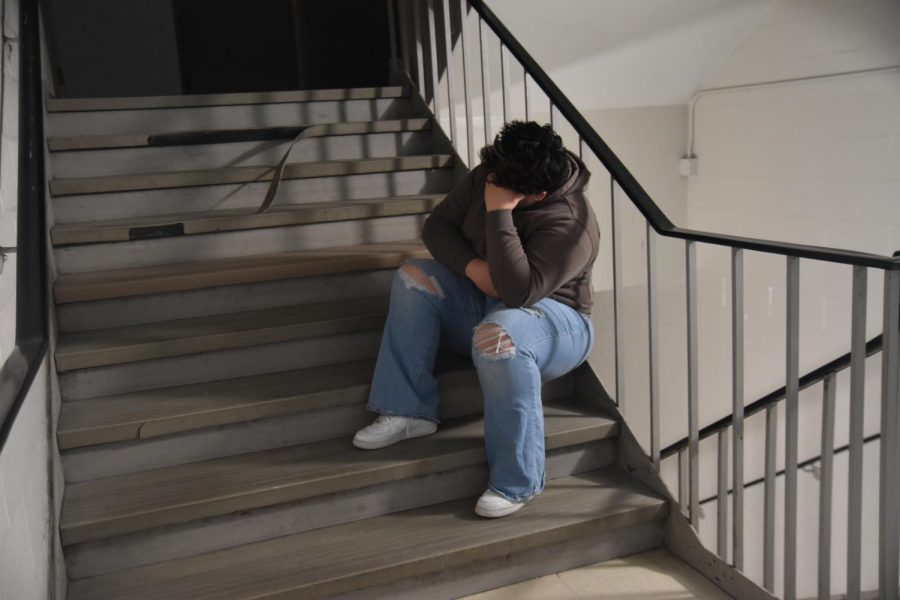How To Grieve
To anyone who has lost a loved one, these steps will help you through this tough journey
March 9, 2023
You’re overcome with confusion as you hang up the phone. “Is she okay?” You ask but you already know the answer. As if losing a loved one isn’t enough trauma, imagine your school goes on lockdown because there is a gun in the school and you’re frozen with fear. Your anxiety rises and you experience that night all over again. Many people have experienced these triggering feelings and anxiety about situations after grief. These steps will help you through the journey of grief and overcome the everyday struggles that trigger anxiety related to your grief.
You grieve at the same level you love. — Counselor Ryan Bracken
Step 1: Denial
Usually, denial is the first step. You will deny the fact that this person is no longer in your life. Deny the panic attacks that happen when you drive past an ambulance. Remember that the ambulance does not signal that something is happening to someone close to you. Do your best to not spiral into a state of panic. Our minds are so stubborn, and we convince ourselves that if we can shove it away and we’ll be healed but sadly that is not how this works. Eventually, you will realize that their time on earth is completed. You will question why the most beautiful people leave us so soon, why bad things happen to good people and it’ll never be easy.
Step 2: Anger
After coming to terms that they are gone, you will be angry. “I was so pissed,” teacher Laurie Huss Steils said. Huss-Steils lost her dad in 2021. Angry that now you come home to no mother, to no father or grandparent. That you’re achieving milestones without them. Even angry that when you desire a hug you won’t want one from anyone else but them. It’ll seem so unfair, and you’ll push so many people away. You will feel so misunderstood and different that it’ll be so overwhelming. Especially, when you feel stressed with schoolwork it’ll trigger your grief. You will then push yourself to race through these stages, but you must be patient and feel all the emotions.
Step 3: Bargaining
You will then feel like you will do anything to get rid of the pain. You may find yourself getting overly committed to school trying to do anything to fill your time, so it won’t hurt so bad. Others even choose to involve themselves in negative activities like drugs and drinking to feel better in the moment, but this will not change the fact they are gone or calm your anxiety. You’ll hide from the pain and convince yourself you are not in pain because you’ll feel shame. Shame creeps up because you know they are watching over you and want the best for you. You find out, in reality, you’re hurting yourself or making you numb to your feelings.
Step 4: Depression
Then depression will hit. Getting up for school will be so damn hard and it will trigger so many memories, like looking forward to coming home to your mother but she’s gone. Life will seem black and white. Your stubbornness will take over and you’ll think you don’t need help or that therapy is uncomfortable. Grief is such a personal feeling and can be unexplainable. For example, when you’re dissociating in fear because you don’t feel safe in the environment you’re in or even safe in your own body, you won’t know how to explain that. Though, not everyone experiences depression. There are a lot of people that are emotionally disconnected. Some people that have experienced grief aren’t always close to the loved one, but they still feel sadness. You don’t have to be super close to the individual to grieve.
Step 5: Acceptance
“I’m not mourning because it’s been years,” teacher Jeramiah Cox said, but he still feels sadness. No matter how old or how young you are grief will still hurt. Everyone’s grief is different, and everyone grieves differently but that’s okay because it’s completely normal. The most certain thing in life, is death. You come into this world to grow, learn, reproduce, etc, and

at the end, you pass to the other side. It’s unfortunate how this world works and all you can do is keep going. Also being in high school doesn’t make it any easier trying to mourn a loved one because you have lost your identity and searching for a new purpose but how can you if you are just a kid. Accepting the loss is the hardest part and accepting the things we can’t control. You will feel so disconnected from the world, from your friends and family but you will survive. You will breathe clearly again. You will move forward and be happy with your life. You will wish and be disappointed. It won’t be easy; the pain will never go away but grief does not define you. Accepting does not mean you forgot, it means you accept you have no choice but to keep living. Find ways to honor your loved one and keep them alive. I have listed these steps, but I guarantee you will not experience it in this order. Grief is messy and everyone experiences it differently. Remember to feel and breathe and don’t do it alone. Find people you trust and find therapy services. “You grieve at the same level you love,” counselor Ryan Bracken said.








